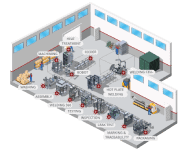As the global population is expected to reach 10 billion people by 2050, the demand for goods is steadily increasing. Companies that sell manufacturing automation equipment must help manufacturers across industries meet growing demand with faster and more efficient production methods. They must do so even in the face of labor shortages, weak supply chains, and scarce materials.
Automation is the key to addressing these challenges. Real-time data monitoring will allow automation programming to continuously improve manufacturing processes, and generative design will play a more active role in speeding up and refining product development.
Today, programmed machines are highly effective for known, repetitive tasks. The next frontier is not only to program computers to perform actions but also to analyze data and optimize performance based on unexpected events. This reality is coming closer to fruition, as machine learning strengthens manufacturing processes with the aid of vast networks of sensors. Robotic process automation (RPA) software also advances automation technologies by monitoring and mimicking human actions to more effectively automate.
Whatever the future holds for the manufacturing automation industry, one thing is certain: companies advancing automation technology today will play a pivotal role in how the manufacturing industry operates in the coming years.


